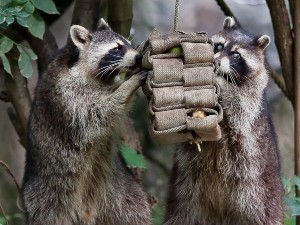
Raccoons have really bad eyesight. Humans and many other animals use our eyes to find food. So how do raccoons find food?
Raccoons find food using their sense of touch and a sense of smell. Raccoon hands are seldom still, they are always fidgeting, feeling around looking for food. They also have very sensitive olfactory receptors which are used to pick up scents of food.
Every animal in existence needs food and every animal needs to find a way to find said food, raccoons are no exception. In some cases, these animals have the added burden of having to find food in urban environments. Thus, the question you may have on your mind is how do raccoons find food both in urban environments and in the wild. If you’re a raccoon lover, a wildlife enthusiast or are simply curious this article is for you.
Table of Contents
How do raccoons find food?
One of the ways that raccoons find food is by using their fingers to feel around. You may have noticed that raccoon hands are seldom still, they are always fidgeting, feeling around. As the animal feels around its environment it sometimes comes into contact with food. It will quickly smell the food and eat it. The raccoon does not need to see what its eating and will usually look straight ahead as it eats its food.
Another way these animals find food is by smell. Raccoons have very sensitive olfactory receptors which are used to pick up scents. As these animals look for food in the forest the scent of food attracts them, they will follow this scent until they find something that they can eat.
Raccoons developed this excellent sense of smell and touch because their eyesight is quite bad. They don’t use their eyesight to find food and thus they have to rely on the above two senses to find their food.
Why do raccoons put food in water?
Scientists used to belive that raccoons washed their food to get rid of dirt but this isn’t the case. If you pay close attention, when a raccoon washes its food or dunks its food in water, sand and dirt is sometimes left on the food.
The action of dunking food in water makes their hands more sensitive, this helps the animal understand what it is eating. The nerves on a raccoon’s hands communicate what the size, temperature, texture and weight of the food is, this helps the racoon understand what it’s eating. These animals have developed this ability over time and it is now innate to them.
The dunking of food, and thus the dunking of their hands, excites the nerves and this helps them get a more vivid idea of what it’s holding. This dunking is necessary because raccoons don’t have the best eyesight, this is a substitute for their bad eyesight
This is also how they’re able to forage during the night time. Their eyesight isn’t the best but they don’t need it at night to successfully forage, it’s all in their hands and their sense of smell.
What do raccoons eat
Raccoons are opportunist eaters, they will eat whatever they have access to. These animals will eat both plant and animal matter and they will even eat from your garbage
In the wild, raccoons more have access to a healthier diet. The foods that they can eat in the wild include grasshoppers, clams, acorns turtles, eggs, fish, squirrels, leave,s cricket,s worms, frogs, snakes and anything else edible.
These animals do not have access to such healthy foods in urban areas, and this is why they have to rummage through your trash to get a meal. Raccoons in urban areas eat pet food, garbage, roadkill and any food left outside in the open. They’re not fussy eaters and will eat a lot of questionable foods before they go hungry
Summary
In summary, raccoons find food using their sense of touch and a sense of smell. They have a very advanced sense of smell, they can smell things that humans can’t and their sensitive hands have receptors which communicate what they are holding to their brains. They dip food into water to excite these receptors and this helps better identify food. They are not picky eaters, these animals will eat frogs, grasshoppers, turtles, snakes, garbage, roadkill, leaves, acorns and garbage.
If you enjoyed this article then you may also be interested in other raccoon related articles. Here are some articles that you may be interested in: why do raccoons tear up lawns, why are raccoons different colours, what do urban raccoons eat, why are raccoons nocturnal, why are raccoons protected


